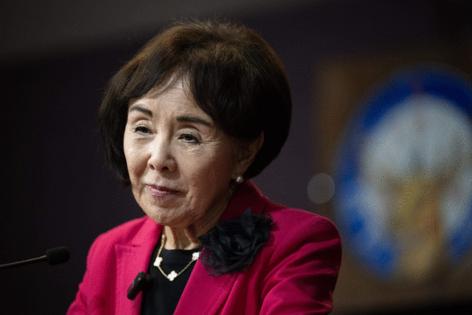Here's a guide to what happens once the federal government shutdown ends
Published in Political News
WASHINGTON — The federal government shutdown, which begins its seventh week Tuesday, appears close to being over. But when will things get back to normal?
There’s no easy way to answer the question. The Senate passed a plan Monday to reopen the government and fund most agencies until Jan. 30. Funds for agriculture, veterans, military construction and congressional budgets would stretch until Sept. 30.
The House is expected to vote as soon as Wednesday.
Approval and the anticipated signature of President Donald Trump would set in motion a vast network of agencies returning to normal.
The comeback will be slow at times and instant at others. “The return of the government will probably vary a lot by agency,” said Darrell West, senior fellow at Washington’s Brookings Institution.
“The transitional effects back to a fully reopened government are going to be uneven,” said Rachel Snyderman, managing director of economic policy at Washington’s Bipartisan Policy Center.
Where essential employees such as law enforcement personnel have continued working, the public is likely to notice little change. About 730,000 federal workers have continued to work without pay. Another 670,000 have been furloughed, according to the center.
Agencies where most workers kept working, but often found they had to take time off for child care or illness, will vary in how fast they’ll be at full strength.
Snyderman said that after the 2018-19 shutdown, which lasted 35 days, it took the air traffic control system about two months to return to full strength.
In agencies where a lot of people were furloughed, there’s likely to be delays. For instance, the Department of Education, said West, “could take a while” to come back. Most of its employees were furloughed.
What to expect if the shutdown ends
Q. Once the shutdown ends, will federal workers receive back pay?
A. As the bill is currently written, yes.
Q. Will they be paid on the next scheduled payday?
A. The next payday for most federal workers is Nov. 21. It’s not clear when back pay will be available. “This will be confirmed when the bill becomes law” because the legislation guarantees that they will be paid on all paydays through January expiration, Snyderman said, adding that back pay will be processed as soon as possible once the bill becomes law, regardless of the upcoming federal civilian and military pay schedules.
Q. Will the Supplemental Nutrition Assistance Program be funded?
A. Yes. The bill provides money for agriculture programs through Sept. 30, 2026.
Q. Will it become easier to get service at Social Security, Medicare and veterans benefits?
A. Yes. Though benefits were paid throughout the shutdown, some services were curtailed or shut down. “At the Social Security Administration, for example, because so many employees remained working, the goal will be to get operations fully back to normal — such as customer service curtailed during the shutdown — at as fast a pace as possible,” Snyderman said.
Q. Will anyone be fired?
A. The bill guarantees there will be no reductions in force through the end of January, and those dismissed during the shutdown can get their jobs back.
Q. When will parks and museums reopen?
A. As soon as possible. Museums should open immediately, Snyderman said. Getting parks ready could take a few days, as services such as cleaning restrooms or repairing damage could take some time.
Will the House end the shutdown this week?
Q. Are prospects good for House passage?
A. The bill needs a simple majority to win in the House. There are 219 Republicans and 214 Democrats. Some Democrats are considering voting yes.
Q. Is there anything Democrats, or for that matter wary Republicans, can do to slow the bill down or defeat it?
A. Debate is much easier to limit in the House. The bill can come up, be debated and voted on all in one day. The House is scheduled to reconvene Wednesday.
Q. U.S. Rep. Doris O. Matsui and other Democrats panned the deal shortly after it was announced. Other California Democrats have done the same. Why?
A. They are angry that there’s nothing in the bill that would help people who face huge increases in their health care premiums next year. The enhanced credits that help lower and middle class people afford Obamacare-inspired policies expire at the end of this year.
Q. Is there hope the credits can be extended?
A. 50-50. The Senate is likely to vote on an extension next month. In the House, Republican leader have been reluctant to go along, but there could be enough GOP and Democratic support to pass something.
_____
©2025 The Sacramento Bee. Visit sacbee.com. Distributed by Tribune Content Agency, LLC.
























































Comments